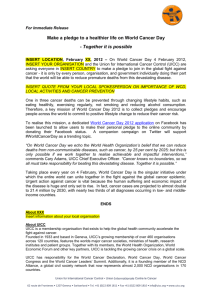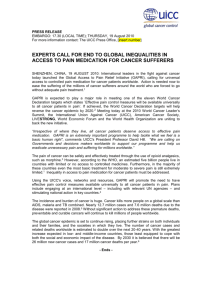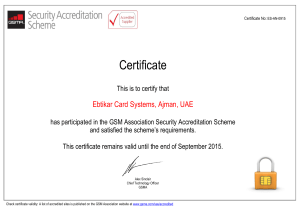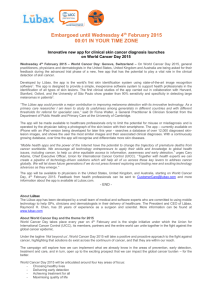ABSTRACT: 2013 ELAM Institutional Action Project Poster Symposium
advertisement
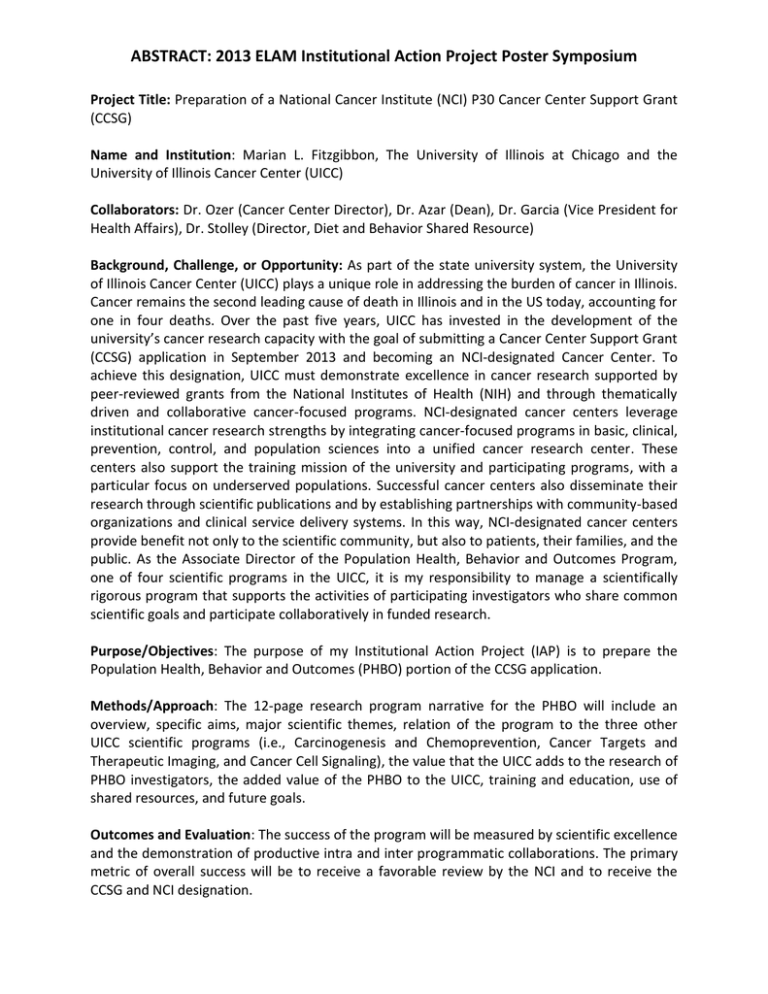
ABSTRACT: 2013 ELAM Institutional Action Project Poster Symposium Project Title: Preparation of a National Cancer Institute (NCI) P30 Cancer Center Support Grant (CCSG) Name and Institution: Marian L. Fitzgibbon, The University of Illinois at Chicago and the University of Illinois Cancer Center (UICC) Collaborators: Dr. Ozer (Cancer Center Director), Dr. Azar (Dean), Dr. Garcia (Vice President for Health Affairs), Dr. Stolley (Director, Diet and Behavior Shared Resource) Background, Challenge, or Opportunity: As part of the state university system, the University of Illinois Cancer Center (UICC) plays a unique role in addressing the burden of cancer in Illinois. Cancer remains the second leading cause of death in Illinois and in the US today, accounting for one in four deaths. Over the past five years, UICC has invested in the development of the university’s cancer research capacity with the goal of submitting a Cancer Center Support Grant (CCSG) application in September 2013 and becoming an NCI-designated Cancer Center. To achieve this designation, UICC must demonstrate excellence in cancer research supported by peer-reviewed grants from the National Institutes of Health (NIH) and through thematically driven and collaborative cancer-focused programs. NCI-designated cancer centers leverage institutional cancer research strengths by integrating cancer-focused programs in basic, clinical, prevention, control, and population sciences into a unified cancer research center. These centers also support the training mission of the university and participating programs, with a particular focus on underserved populations. Successful cancer centers also disseminate their research through scientific publications and by establishing partnerships with community-based organizations and clinical service delivery systems. In this way, NCI-designated cancer centers provide benefit not only to the scientific community, but also to patients, their families, and the public. As the Associate Director of the Population Health, Behavior and Outcomes Program, one of four scientific programs in the UICC, it is my responsibility to manage a scientifically rigorous program that supports the activities of participating investigators who share common scientific goals and participate collaboratively in funded research. Purpose/Objectives: The purpose of my Institutional Action Project (IAP) is to prepare the Population Health, Behavior and Outcomes (PHBO) portion of the CCSG application. Methods/Approach: The 12-page research program narrative for the PHBO will include an overview, specific aims, major scientific themes, relation of the program to the three other UICC scientific programs (i.e., Carcinogenesis and Chemoprevention, Cancer Targets and Therapeutic Imaging, and Cancer Cell Signaling), the value that the UICC adds to the research of PHBO investigators, the added value of the PHBO to the UICC, training and education, use of shared resources, and future goals. Outcomes and Evaluation: The success of the program will be measured by scientific excellence and the demonstration of productive intra and inter programmatic collaborations. The primary metric of overall success will be to receive a favorable review by the NCI and to receive the CCSG and NCI designation. Preparation of a National Cancer Institute (NCI) P30 Cancer Center Support Grant (CCSG) Marian L. Fitzgibbon, Ph.D. University of Illinois at Chicago (UIC), University of Illinois Cancer Center (UICC) Abstract Joe G. N. (Skip) Garcia, M.D. (Vice President for Health Affairs, UIC), Dimitri Azar, M.D., M.B.A. (Dean of the College of Medicine, UIC), Howard Ozer, M.D. (Director, University of Illinois Cancer Center), Melinda R. Stolley, Ph.D. (Director, Diet and Behavior Shared Resource, University of Illinois Cancer Center ) Cancer Focus Peer Reviewed Funding $27,472,738 Directs PHBO Program Snapshot PHBO Peer-Reviewed Funding Millions Background, Challenge, or Opportunity: As part of the state university system, the University of Illinois Cancer Center (UICC) plays a unique role in addressing the burden of cancer in Illinois. Cancer remains the second leading cause of death in Illinois and in the US today, accounting for one in four deaths. Over the past five years, UICC has invested in the development of the university’s cancer research capacity with the goal of submitting a Cancer Center Support Grant (CCSG) application in January 2014 and becoming an NCIdesignated Cancer Center. To achieve this designation, UICC must demonstrate excellence in cancer research supported by peerreviewed grants from the National Institutes of Health (NIH) and through thematically driven and collaborative cancer-focused programs. As the Associate Director of the Population Health, Behavior and Outcomes Program, one of four scientific programs in the UICC, it is my responsibility to manage a scientifically rigorous program that supports the activities of participating investigators who share common scientific goals and participate collaboratively in funded research. Purpose: The purpose of my Institutional Action Project (IAP) is to prepare the Population Health, Behavior and Outcomes (PHBO) portion of the CCSG application. Methods: The 12-page research program narrative for the PHBO will include an overview, specific aims, major scientific themes, relation of the program to the three other UICC scientific programs (i.e., Carcinogenesis and Chemoprevention, Cancer Targets and Therapeutics & Imaging, and Cancer Cell Signaling), the value that the UICC adds to the research of PHBO investigators, the added value of the PHBO to the UICC, training and education, use of shared resources, and future goals. Outcomes: The success of the program will be measured by scientific excellence and the demonstration of productive intra and inter programmatic collaborations. The primary metric of overall success will be to receive a favorable review by the NCI and to receive the CCSG and NCI designation. Collaborators $10 $8 $8.2 $6 CCP, $4,641,377 $4.6 CCS, $8,574,428 $4 CTTI, $4,902,435 $2 PHBO, $9,354,497 Funding Per Member $188,165 $PHBO CCP CTTI CCS $1.2 $11K Population Health, Behavior & Outcomes Carcinogenesis & Chemoprevention Cancer Targets, Therapeutics, & Imaging Cancer Cell Signaling Specific Aims The work of the PHBO program can be grouped into three major themes (i.e, Behavioral Research, Access and Health Care Delivery, and Cancer-Related Policy Research) under three specific aims. The goal of the three aims are to work toward the goal of understanding and enhancing cancer-related outcomes for atrisk and underserved populations within a socio-ecological framework. To identify behavioral underpinnings that influence cancer-related lifestyle behaviors (e.g., tobacco use, diet, physical inactivity) in at-risk and underserved populations through observational, clinical, and community-based studies across the cancer continuum; To identify innovative strategies to enhance screening, access and health care delivery across the cancer continuum; and To advance policy research with a specific focus on tobacco and obesity to understand how the environment affects cancer-related behaviors from a population perspective. Direct Costs Shown Future Program Objectives Continue to integrate the Diet and Behavior Shared Resource (DBSR) into newly developed and ongoing cancer-related projects. Expand inter-programmatic collaborations. Continue to recruit and train pre- and postdoctoral fellows from underserved populations in cancer-related health disparities research.
